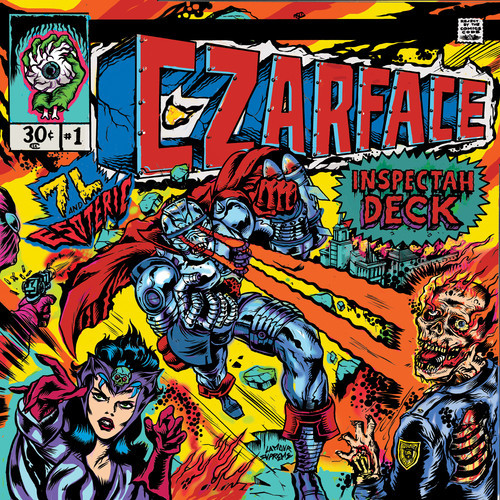I grew up on an island, which means that, similar to other people who were reared within the bounds of a relatively isolated region of square mileage, I came to know every little contour in the roads to places I frequented. My school, post office, grocery store, driveway — the profiles in terrain are forever etched in my memory. So even if structures or alterations to those paths are laid subsequently, the recollection will remain, even after the temporal manifestations are long gone. I could navigate those few square miles as a blind tour guide for your mainland ass.
Inspectah Deck knows what I’m talking about because he too grew up on an island. And, while that’s pretty much where the extent of our similarities end, disparate lives can’t change the fundamental verity that we are, and always will be, Islanders: a fairly unique breed that tends toward co-mingling with like-minded others and holding the conceit that island life — in its own stubborn rebuke and isolationist way — is the only life.
With that in mind, consider Deck’s latest LP, Czarface, his fifth studio album — make that co-album, more on that in a second — a shining example of what hip-hop should always strive to be, at least to a devoted segment of rap nationalists untroubled by the anachronism of rejecting the clean synth lines of this century’s rap in favor of its dusty aesthetics of the early to mid ‘90s. I’m talking of course about the music’s famed Golden Era, a formative time for Staten Island’s Inspectah Deck and his collaborative partners 7L and Esoteric, producer and MC respectively who have carved out respected names for themselves in Boston’s underground circuit.
Czarface (which also serves as the name of the trio as they exist as a group) acts as a caretaker to the Golden Era revivalist spirit, a state of being that more and more exists as a haven unto itself the further away we get from the time period. 7L is credited as producer or co-producer for 13 of the album’s 14 tracks, and each one is constructed as a monument to a heyday defined by arenose breaks, abrupt sample flips, and dexterous record scratches. DJ Premier shows up for the lone composition not attributed to 7L, “Let It Off”, an essential clinic on why New York City boom-bap is generally considered superior to all modes of rap that have come since. There’s a fleeting beauty in the way Premier stitches together his snatched vocal snippets, using the segments’ differences in tone to create hooks that are unexpected and addictive at every turn. Rap music may have come to exist figuratively as “something out of nothing,” but its literal incarnation is based on the aural alchemy as conveyed here by virtuoso Premier.
7L is a producer schooled in the same techniques as Primo with a bent toward Marvel Comics worshipping which he laces into his subterranean-minded work. Here he practices RZA-like discordance and tightly wound melody (“Shoguns”, “Savagely Attack”), blunted Cali bass (“Czar Refaeli”), and salvaged hardcore (“Hazmat Rap”, “Poisonous Thoughts”). Wu-Tang alumnus Inspectah Deck has always sounded like he’s rapping from the top of a mount, and his perfectly pristine, in-the-pocket declarations of dopeness and street science drops are an ideal accompaniment to 7L’s beats. Esoteric on the other hand deals in lyrical miracles, dangerously approaching rappity-rap for the sake of being showy (“World War 4”), but redeeming himself by never acting perfunctory in a particular school of lyricism that often rewards style over substance. Deck and Eso play well off each other’s strengths and it’s their chemistry that prevents Czarface from sinking under the weight of repetitiveness, the single greatest attribute that dooms its traditionalist form (see: every one of Inspectah Deck’s previous solo albums).
It must be disorienting for someone like Deck to witness the recent so-called resurgence of New York City boom-bap as an MC whose career bread has been buttered by the holy substance all along. The appearance of rap’s new Golden Era revivalist breed on this album seems to affirm the deeply held belief that this shit never really went anywhere in the first place without expressly saying so. The guest list on Czarface reads like a who’s who in new Era underground: Roc Marciano, Oh No, Action Bronson, Mr. Muthafuckin’ Exquire (not to mention Wu compatriots Ghostface Killah and Cappadonna).
One other important thing I should mention about Islanders is that we tend to spend a lot of time figuring out how to get off the damn body of land while stubbornly refusing to let go of its lure, an inverse conception that usually manifests itself by us attempting to get all of our friends to join us on our island at some point or another. In the end, it’s satisfying to watch people flock because, as it turns out, the island life is a fashionable one. It’s nice to know that the place, even for its limitations, has stuff worth offering the outside world. Most of all, however, it’s just nice to know you can always go home again.

